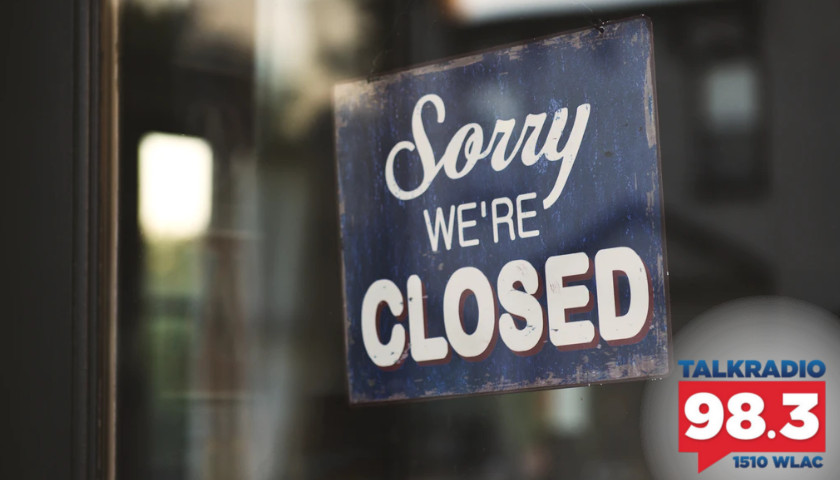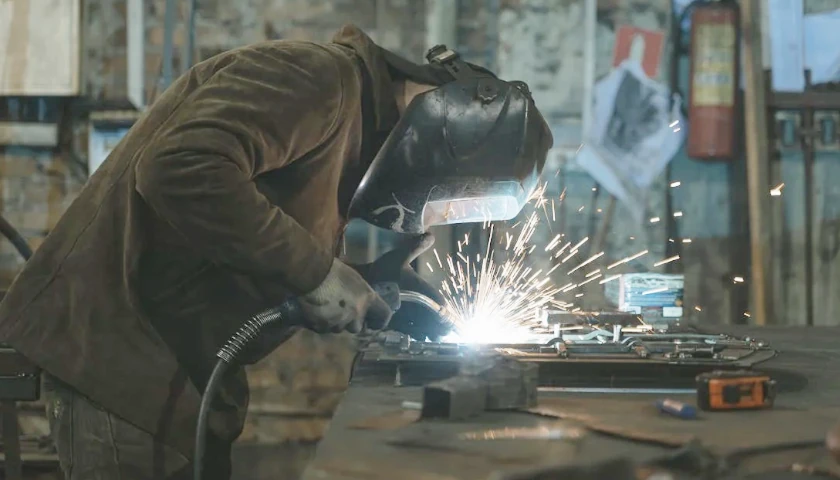Live from Music Row Thursday morning on The Tennessee Star Report with Michael Patrick Leahy – broadcast on Nashville’s Talk Radio 98.3 and 1510 WLAC weekdays from 5:00 a.m. to 8:00 a.m. – host Leahy welcomed the owner of Refined Men’s Salon in Cool Springs, Tennessee, Julie White in studio to The Entrepreneurs Corner to recall when coronavirus hit and how her job turned into a business opportunity.
Leahy: This is The Entrepreneurs Corner. Our entrepreneur featured today is Julie White, the owner of Refined Men’s Salon of Cool Springs. I was telling everybody Julie about how I spent a lot of time trying to find the right place to get a really good haircut.
And a couple of years ago, I found it at Refined Men’s Salon. It was at the time on McEwen Road. And was a beautiful space. You were a manager there at the time?
White: I was. I was assistant manager then of 18|8
Leahy: It was called 18|8 as part of a national chain.
White: Yes.
Leahy: Before it became Refined Men’s Salon.
White: Absolutely. Yes. So it was a 12 chair salon. Absolutely.
Leahy: Twelve chairs. And it was one of these places whereas a customer, you go in and you sit down and you got a nice sofa you sit in. And the nice person comes over and says, would you like a drink?
They’ll be with you in a moment. It was very nice. And the 12 chairs, and a very nice little booth that everybody had there. A very impressive facility.
What happened to that facility after coronavirus hit? So the coronavirus hits and you are the assistant manager.
White: I had actually made a hiatus to go to study hair in New York City for a little bit. During the height of corona coming into the town, I was in New York City. I got back into town in March. We closed down on March 23rd.
Leahy: Of course. All the big national emergencies came about on March 13th. Right in the middle of all that and you had gone up to New York to study to improve and learn more about hair.
White: To work in all of the high-trend hair areas.
Leahy: Let me just stop. High-trend hair areas. What is a high-trend hair area?
White: It’s generally what you think of for any type of high fashion area. So anywhere where you look for that, that is the point in the haircut where you’re going to try to do more of that year. The trends and everything. That’s where it starts.
Leahy: Where in New York City are the high-trend fashion areas?
White: I personally worked two blocks off of Fifth Avenue.
Leahy: Right off Manhattan. So that would be a high trend area for everything.
White: Yes. Right down from Sacks. Everybody has super fashion there. And I wanted to gain as much knowledge like we were saying before, as much as I could about men’s hair.
And that was just the next route. So they closed everything down there and I came to Tennessee again and took over at the salon and then we shut down a week later.
Leahy: So when you say shut down the owner at the time, what kind of governmental rules and restrictions were placed on the salon? You had 12 chairs. It was very busy. I don’t know how many employees? 20 or 30? There were quite a few employees.
White: At that moment we had nine.
Leahy: You had nine. Very busy.
White: Yes. Very busy. All the chairs were booked open to close every day. They shut us down for six weeks.
Leahy: They shut you down entirely.
White: Yes. We could not go into the building for six weeks or cutting.
Leahy: Who shut you down?
White: The city padlocked our door.
Leahy: The city padlocked your door.
White: Every non-essential business was done.
Leahy: But see, this bet gets back to what’s essential and what’s not essential. I think getting your hair cut, I think that’s pretty essential. (Laughs)
White: I feel like I’m very essential.
Leahy: But, you know, Walmart, they called essential. Krogers, they called essential. But the small businesses were non-essential.
White: No, unfortunately.
Leahy: And what did the people that were cutting hair do for money during that period of time?
White: Luckily, we did have a lot of government assistance coming in. I know a lot of my coworkers did that. I personally worked at Whole Foods.
Leahy: Oh, you went to Whole Foods and worked?
White: I tried to fill out the unemployment thing. I was like, I’m done.
Leahy: So you just got a job at Whole Foods? So Whole Foods was essential but the haircutting place wasn’t?
White: Unfortunately.
Leahy: So then what happened after that?
White: So we got back May sixth. We were only able to use a portion of our chairs because of our square footage.
Leahy: Whoah, whoah, whoah. Now hold it. You had twelve chairs. How many were you able to use?
White: Approximately four to five a shift.
Leahy: Now, who said you could only use four or five? That was the mandate that based on our square footage, we could only have a certain amount of people in the building.
Leahy: Who gave you that mandate?
White: The Williamson County mandate.
Leahy: Yikes.
White: Yeah. It was rough. And now we were very safe. We had to make sure that everybody had masks on.
Leahy: I remember you’d go in, you’d wear a mask. Get your haircut. Everybody was wearing a mask.
White: Absolutely. And even the stylists weren’t even allowed to be in the break room at the same time. We had a very small break room at the time. And so we had to take shifts.
And if we were eating, we couldn’t have anybody’s lunches at the same time and just keeping that distance away from each other. Now you were the assistant manager, but not the owner at that time.
White: Absolutely.
Leahy: How did the owner make money when they were only able to use four out of twelve of the chairs that they had set up in that business?
White: So, fortunately, we had tons of people calling in trying to get haircuts. And when we first opened, we had about a three-week wait time to get an appointment. And that really helped bring a lot of revenue in. I, personally was working 10-11 hour days every single day.
Leahy: So the people that were able of the four chairs that were occupied, they were busy.
White: Oh, yes. Oh, yes. We were still turning out maybe 100 to 130 people a day. Just between three, four, or five stylists and whoever we had. And we did what we could. We made it work somehow, some way.
Leahy: But in the end, the owner of the business found that with four chairs working and eight forced to not be working by the local government, couldn’t really make it financially, ultimately and wanted to get out.
White: It was less of a financial situation in this, but it was more of she wasn’t a hairstylist. And there’s a lot of situations that were just a headache to deal with.
If you are not in the industry and if you do not have a huge passion for it, she kind of fell into it whenever 18|8, came into Franklin, and she found it out. And that’s when I took over.
Leahy: So you were able to purchase the business from her?
White: Yes. Yes.
Leahy: And now you’re relatively young.
White: Yeah. I’m 30.
Leahy: But still. That’s less than half my age. (White giggles) And you own your own business. Did you think, how am I going to make this work?
White: I didn’t have time to think that I just kind of jumped in and just kind of rolled with the punches as soon as I could. The one thing that I saw first was that we had twice or three times as many people calling in as we had chairs available.
Leahy: So this is what you call a clue.
White: Yes.
Leahy: There’s a big demand for a good haircut in Franklin, Tennessee.
White: Exactly. And that’s not anything that we didn’t already know. So my business partner and I, Ashley Mullins, decided to move it to a place where we could separate into separate rooms. So it’s salon suites now.
Leahy: So now you move to another location in Franklin temporarily?
White: Yes.
Leahy: And it’s like one of these places where they have all sorts of little separate little spaces. And instead of a big facility in separate places. You’ve moved there. And how do people find out about you?
Because they used to go by where it was on the McEwen, but now it’s on a different location. It’s kind of hard to find. How do you find people? How do they find you?
White: Absolutely. We have a lot of marketing now. We have all of our little Easter eggs everywhere saying we are in My Salon Suites. Our address on Google is correct right now.
Leahy: So how do people find you?
White: Yes. Absolutely. And also people walk in the outside of the building says salon, and people will walk in all the time just requesting appointments if we have space available. Absolutely.
Leahy: And how busy are you now in the new setup?
White: We have approximately right now 85 to 90 percent utilization across the board in all of our schedules.
Leahy: When we come back, I want to talk about this. You heard the number there. This is the entrepreneurial side of Julie. She knows the numbers. She knows zip codes.
She knows the marketing details and the success from understanding those marketing details. We’ll talk about that a little bit when we get back.
Listen to the second hour here:
– – –
Tune in weekdays from 5:00 – 8:00 a.m. to the Tennessee Star Report with Michael Patrick Leahy on Talk Radio 98.3 FM WLAC 1510. Listen online at iHeart Radio.





